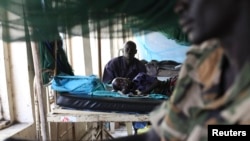Monday marks World Health Day for 2014.
The World Health Organization is highlighting the annual observance with information about the increasing threat of vector-borne diseases.
More than half the world's population is at risk from diseases such as malaria, dengue, leishmaniasis, Lyme disease, schistosomiasis and yellow fever, carried by mosquitoes, flies, ticks, water snails and other vectors.
Vector-borne diseases affect the poorest populations, particularly where there is a lack of access to adequate housing, safe drinking water and sanitation. Malnourished people and those with weakened immunity are especially susceptible.
More than one billion people are infected and more than one million die from vector-borne diseases every year.
WHO says the diseases are entirely preventable.
A newly published brief on vector-borne diseases outlines steps that governments, community groups and families can take to protect people from infection.
WHO Director General Dr. Margaret Chan says "simple, cost-effective interventions like insecticide-treated bed nets and indoor spraying have already saved millions of lives."
Dr. Lorenzo Savioli, director of WHO's Department of Control of Neglected Tropical Diseases, says "increased funds and political commitment are needed" to sustain existing vector-control tools and to conduct urgently needed research.
Schistosomiasis, transmitted by water snails, is the most widespread of all vector-borne disease. It affects almost 240 million people worldwide and can be controlled through regular mass treatment of at-risk groups with a safe, effective medicine and access to safe drinking water and sanitation.
WHO says in the past two decades many vector-borne diseases have re-emerged or spread to new parts of the world. Mosquito-borne dengue is now found in 100 countries, putting more than 2.5 billion people - over 40 percent of the world's population - at risk.
Reports from Greece say that malaria has returned there for the first time in 40 years.
The World Health Organization is highlighting the annual observance with information about the increasing threat of vector-borne diseases.
More than half the world's population is at risk from diseases such as malaria, dengue, leishmaniasis, Lyme disease, schistosomiasis and yellow fever, carried by mosquitoes, flies, ticks, water snails and other vectors.
Vector-borne diseases affect the poorest populations, particularly where there is a lack of access to adequate housing, safe drinking water and sanitation. Malnourished people and those with weakened immunity are especially susceptible.
More than one billion people are infected and more than one million die from vector-borne diseases every year.
WHO says the diseases are entirely preventable.
A newly published brief on vector-borne diseases outlines steps that governments, community groups and families can take to protect people from infection.
We are sorry, but this feature is currently not available
WHO Director General Dr. Margaret Chan says "simple, cost-effective interventions like insecticide-treated bed nets and indoor spraying have already saved millions of lives."
Dr. Lorenzo Savioli, director of WHO's Department of Control of Neglected Tropical Diseases, says "increased funds and political commitment are needed" to sustain existing vector-control tools and to conduct urgently needed research.
Schistosomiasis, transmitted by water snails, is the most widespread of all vector-borne disease. It affects almost 240 million people worldwide and can be controlled through regular mass treatment of at-risk groups with a safe, effective medicine and access to safe drinking water and sanitation.
WHO says in the past two decades many vector-borne diseases have re-emerged or spread to new parts of the world. Mosquito-borne dengue is now found in 100 countries, putting more than 2.5 billion people - over 40 percent of the world's population - at risk.
Reports from Greece say that malaria has returned there for the first time in 40 years.





